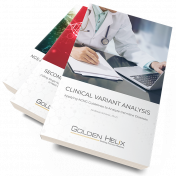Tumor profiling via next generation sequencing (NGS) often reveals secondary germline variants that may constitute important incidental findings. In May 2021, the American College of Medical Genetics and Genomics (ACMG) released an updated policy statement for reporting incidental findings in exome and genome sequencing data along with a corresponding list of genes. These recommendations state that laboratories should report pathogenic… Read more »
Clinical labs often maintain gene panels, which are lists of genes with evidence of disease association. These panels are used to prioritize variants and limit interpretations to a predefined set of test-specific genes. In general, gene panels should be stored independently of any specific project or interpretation, as it is common for an individual gene panel to be generally applicable… Read more »
Clinical Variant Analysis – Applying ACMG Guidelines to Analyze Germline Diseases The clinical interpretation of genetic variants is time-consuming and requires strict attention to detail. Clinicians must thoroughly review any variants that could potentially cause disease using a complex set of guidelines. There are guidelines for the interpretation of variants relating to hereditary risk, germline diagnostics issued by the American… Read more »
I am excited to announce the release of my new eBook “Clinical Variant Analysis – Applying ACMG Guidelines to Analyze Germline Diseases“! You can download your complimentary by clicking on the button below. The clinical interpretation of variants in Next-Gen Sequencing is a quickly evolving field. While the body of knowledge is growing exponentially, experts have to derive sound, clinical decisions leveraging an… Read more »


